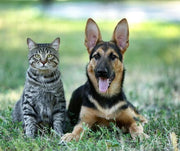Puppy-Proofing Your Home

You did it. You are finally adding a new member to your family! But after all the fun of buying collars, toys, accessories, and naming your pet there are steps you need to take at home to ensure the safety of your puppy. Remember childproof does not always mean pet-proof.
Kitchen
The kitchen has all sorts of smells and tastes not to mention interesting drawers and cabinets. If your puppy can get into the cabinets, they will explore everything in it. Childproof latches can be found at your local hardware store to prevent curious pups from exploring dangerous chemicals or getting into the trash can.
Bathroom
Razors, pills, soap & cotton swabs all left within your dog’s reach can be ingested – which means an emergency trip to the vet. Your family needs to be consistently cleaning up after themselves in the bathroom. Shampoos, soaps, and other accessories need to be out of reach.
Always keep the toilet seat down or keep the bathroom door closed, especially while your puppy is young. They can get into the bowl and possibly drown. It also prevents your dog from creating a habit to drink from the bowl. Keep the trash either in the cabinet or with a locking lid.
Bedroom
Dogs are scent-oriented animals and will gravitate towards things that smell like you. Shoes, slippers, and clothes will be quick to become chew toys if left out. Keep your clothes picked up and shoes behind a closet door. Jewelry and other small ingestible items should be kept in containers and placed in a secure location. Some dogs like to go under the bed or get trapped behind furniture so temporary blockades can be placed to prevent injury.
Living areas
Whether it’s the living or family room, these cozy spaces are usually filled with all kinds of things that can tempt a curious puppy. Stay vigilant in picking up and keeping valuable items such as shoes, or iPods away. Keep the clutter to a minimum as a puppy may find a magazine or pillow that may seem like the perfect form of entertainment to destroy. Cords and wires can seem like the perfect chew toy for a teething animal. Tuck them out of reach, blocking them, or encasing in a PVC tube to ensure safety for your new pet. It's also important to make sure you have plenty of puppy-safe chew toys on hand to help your new addition curb their urge to chew.
If you have young children some of their toys can be little and become a choking hazard to your pet. Make sure your kids are cleaning up after they are done playing with their toys and watching the dog while they are playing with their toys.
Garage and yard
Looking at your garage and yard there are several obvious and not-so-obvious dangers for Fido. Paint, cleaners, insecticides, rodent poisons, fertilizers, antifreeze, and gasoline are a number of common household poisons and chemicals that you have. Antifreeze has a sweet taste that attracts animals but can be deadly if ingested by animals.1 Secure all these bottles, boxes, and containers in a cabinet or store where your pet can’t get them.
Some plants can be poisonous for your pet and cause different reactions. For more information on pet-proofing your backyard, click here.
Better Safe Than Sorry
By pet-proofing your house, you can create a safe environment for your new family member to become adjusted to his new life. Giving them a kennel to stay in while you are away will ensure your pet is in a safe secure location and can’t get into anything you may have missed while pet-proofing. As your pet gets older you won’t have to worry as much about your dog getting into things he shouldn’t. Until then, it’s better to be safe than sorry.
Now that you've brushed up on puppy-proofing, are you ready to introduce your pup to the outside world? Check out our tips on introducing a leash and collar here. Have to leave the pup at home? Find out how to combat separation anxiety.
Sources:
Next article

Related posts
View all-

3 Holiday Recovery Tips for Your Pets
Everybody needs time to recover from the holidays—even your pets. Not only will some pets want to join in on the fun, but they’ll also need a little time to recover. Even if you have a shy guy in your home who prefers staying in their bedding for cats, holiday recovery is a good idea. So, what can you do to create a soothing environment for post-holiday pet care? Read Article -

Keep your Pets Safe During The Holidays
The holidays are fast approaching, and during this beautiful yet busy time of year it is important to remember that our pets can get stressed out too. It could be that company is coming over and Aunt Petunia is not an animal lover. Or your family is rushing from event to event, shopping for gifts, and just generally busy and unavailable. The result is that Fido spends a lot more time outside or alone than normal. Sound familiar? Read Article -

5 Things Your Dog Needs for Holiday Travel
Are you traveling with your four-legged friend during the holiday season? Traveling with your dog can be fun; after all, it’s nice that you don’t have to leave them behind. Still, you should make sure to prepare. You can do some things to make the trip more comfortable for everyone, like picking up a travel kennel and dog food storage container. Read Article




